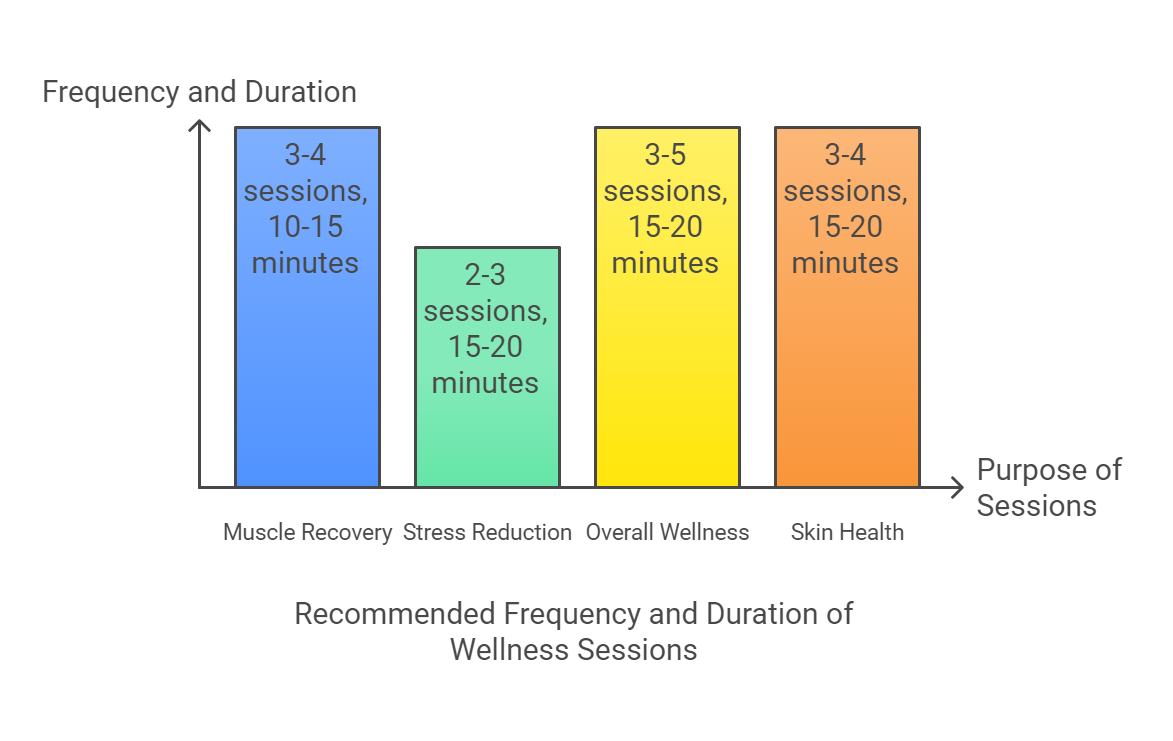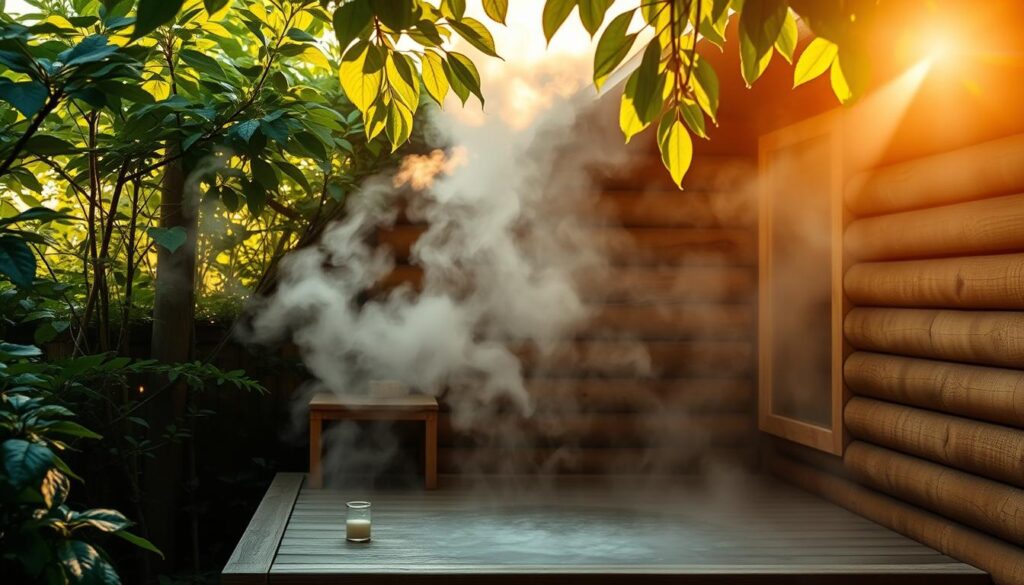Ever thought your outdoor steam sauna could boost your health? The spa world is growing, and backyard saunas are all the rage. Let’s dive into how to get the most health benefits from your own backyard sauna.
Outdoor steam saunas mix relaxation with health benefits. They can improve heart health and mental well-being. Dr. Rhonda Patrick says sauna baths are like moderate exercise, good for the heart.
Using a sauna isn’t just about sweating. It can lower heart disease and stroke risks. It might even help with depression. But to enjoy these benefits, you need to know how to use it right.
Stay hydrated before and after sauna time. The right temperature and timing are important. Saunas aren’t for everyone, especially pregnant women and those with certain health issues.
Table of Contents
Key Takeaways
- Sauna use mimics moderate exercise benefits
- Regular sessions may lower heart disease risk
- Proper hydration is crucial for sauna safety
- Aim for 20-30 minute sessions, four times weekly
- Saunas can boost mood and mental well-being
- Not all individuals should use saunas – check with a doctor
Understanding the Outdoor Steam Sauna Experience
Outdoor steam saunas offer a unique way to relax in nature. They mix traditional wellness with the outdoors’ beauty. These saunas get very hot, between 175 to 194 degrees Fahrenheit.
Barrel saunas are great for the outdoors. They have 1 ½ inch thick walls that keep heat in well. Pod-shaped saunas have a special roof that also keeps heat in.
The type of wood used is important. Softwoods like pine and cedar are good for starting fires. Hardwoods like oak and maple burn slower, keeping the heat steady.
| Sauna Type | Temperature Range (°F) | Humidity Level |
|---|---|---|
| Traditional Steam Sauna | 150-190 | 40-60% |
| Infrared Sauna | 120-140 | Low |
| Steam Shower | 108-115 | High |
It’s best to stay in the sauna for 20 minutes. This helps avoid dehydration and boosts health. Always drink water before and after to stay hydrated.
The Science Behind Sauna Health Benefits
The wood fired sauna is more than a place to relax. Studies show it has many health benefits. Let’s look at the science behind these benefits and how they can make you feel better.
Cardiovascular Improvements
Sauna sessions are great for your heart. Research says using a sauna 2-3 times a week can lower heart disease risk by 23%. If you go 4-7 times a week, this risk drops by up to 58%.
The heat in the sauna helps lower blood pressure and improves blood flow.
Neuroprotective Effects
Your brain also benefits from sauna use. It increases BDNF, a protein that helps grow new brain cells and improves brain function. The heat also releases proteins that protect brain cells from damage.
Mental Well-being Boost
Feeling stressed? Sauna use might help. It’s linked to better sleep and less depression. The heat releases endorphins, which make you feel good and reduce stress.
| Sauna Frequency | Cardiovascular Risk Reduction | Other Benefits |
|---|---|---|
| 2-3 times per week | 23% decreased risk | Improved sleep, reduced stress |
| 4-7 times per week | Up to 58% decreased risk | Enhanced brain function, increased BDNF |
While saunas have many health benefits, it’s important to talk to a doctor before starting a regular routine. This is especially true if you have health issues.
Preparing for Your Outdoor Steam Sauna Session
Getting ready for your backyard sauna is important. It helps you enjoy your garden sauna safely and well.
Hydration Essentials
Drinking water is key for sauna sessions. Drink at least two extra glasses before you go into your sauna. You’ll sweat a lot, losing about a pint.
| Hydration Guidelines | Recommended Amount |
|---|---|
| Pre-sauna water intake | 2+ extra glasses |
| Average sweat loss | 1 pint |
| Post-sauna hydration | “A whale’s portion” |
Pre-Sauna Skincare
Take a quick shower before your sauna. This removes dirt and lotions. It helps your pores open up, making your sauna experience better.
Choosing the Right Time
Many like sauna sessions in the evening for relaxation. Don’t eat for at least two hours before. Beginners should start with 10 minutes, then increase to 30 minutes.

For the best results, do 3-5 sauna rounds with cool-downs in between. Plan for about 3 hours for a full sauna experience. Remember, good preparation is essential for a safe and fun sauna session in your backyard.
Maximizing Skin Exposure in Your Outdoor Steam Sauna
To get the most from your outdoor steam sauna, make sure to expose your skin fully. Wearing minimal clothing lets the heat penetrate deeper and sweat more effectively. This is especially good for those with fibromyalgia or arthritis, as it can help reduce swelling.
Research shows that sauna bathing without clothes can boost its benefits. On average, a person can sweat a pint in just a few minutes. This intense sweating cleanses the skin, removing dead cells, bacteria, and impurities.
Here are some tips for the best results:
- Exfoliate or use a “vasta” (birch twig bundle) to stimulate pores and boost circulation
- Aim for 2-3 sessions per week, each lasting 15-20 minutes
- Stay hydrated by drinking 2-4 cool glasses of water after each session
Whether you’re using a luxury sauna or a cedar sauna, exposing your skin fully can improve your skin health. It also enhances blood circulation and gives you a clearer, more vibrant complexion. Always talk to a dermatologist before starting a sauna routine, especially if you have any skin conditions.
Optimal Duration and Frequency for Sauna Use
Getting the most out of your outdoor steam sauna is all about timing. Finding the right mix of how long and how often you use it can make a big difference. It turns a nice experience into a health boost.
Finding Your Ideal Session Length
Most people find their favorite sauna time to be 15-20 minutes. This lets your body enjoy the benefits without getting too hot. Even shorter sessions of 10-15 minutes can be great if you do them often.
Establishing a Regular Sauna Routine
Being consistent is key when it comes to sauna use. While 1-2 times a week is good, try for 3-4 times a week for the best results. A study with 2,300 middle-aged men showed that using saunas 4-7 times a week can lower death rates more than once a week.
Here’s a quick guide to tailor your sauna routine:

Listen to your body and adjust as needed. Your perfect sauna routine should leave you feeling refreshed, not tired. With time, you’ll find the rhythm that works best for you, making your outdoor steam sauna a powerful tool for health and relaxation.
“Regular sauna use is linked to improved circulation, muscle tension relief, and reduced inflammation. It’s a natural way to boost your overall well-being.”
By adjusting your sauna frequency and session length, you’re setting yourself up for a healthier life. Embrace the heat and let your outdoor steam sauna become a key part of your wellness journey.
Enhancing Circulation During Your Sauna Experience
Your outdoor sauna session can do wonders for your circulation. A barrel sauna or any outdoor sauna type offers unique ways to boost blood flow. Let’s explore some effective techniques to maximize your circulation boost during your sauna experience.

Gentle skin stimulation is key. Try lightly brushing or tapping your skin on arms, legs, and back. This simple action opens pores and enhances surface blood flow. Some sauna enthusiasts use a bundle of birch twigs, known as a “vasta,” to gently whip their skin. This practice not only improves circulation but also leaves your skin feeling smooth.
Incorporating movement can amplify your circulation boost. Stretching exercises in the sauna can improve flexibility and reduce injury risk. For an extra kick, try using a massage stone or roller. These tools can help loosen tight muscles and encourage better blood flow.
- Use a soft brush to stimulate skin
- Try gentle tapping on arms and legs
- Experiment with a “vasta” for traditional skin stimulation
- Incorporate stretching exercises
- Use massage tools for deeper muscle stimulation
Remember, proper ventilation in your outdoor sauna is crucial. It helps maintain ideal temperature and humidity levels, enhancing your overall comfort and health benefits. By combining these techniques, you’ll maximize the circulation-boosting potential of your sauna sessions.
Hydration Strategies for Sauna Sessions
Drinking enough water is essential for a great wood fired sauna experience. Whether you’re in a cozy sauna cabin or a bigger place, these tips can help. They make your session better and keep you healthy.
Pre-Sauna Hydration
Drink at least 32 ounces (1 liter) of water before you go into the sauna. This gets your body ready for sweating. For a 15-30 minute session, being well-prepared is important.
During-Sauna Hydration
Drink water while you’re in the sauna. Try to drink another 32 ounces. This keeps your body balanced and replaces lost fluids.
Post-Sauna Rehydration
Drink 32 more ounces of water after you leave the sauna. This is key for your body to recover from the heat. Some people like to drink tomato juice to replace lost potassium.
Avoiding Dehydration Risks
Only drink water to stay hydrated. Don’t have soda or alcohol as they can dry you out. Newbies should start with 10-15 minutes, and more experienced users can go up to 20 minutes. If you feel dizzy or uncomfortable, get out of the sauna.
| Sauna Stage | Recommended Water Intake |
|---|---|
| Pre-Sauna | 32 ounces (1 liter) |
| During Sauna | 32 ounces (1 liter) |
| Post-Sauna | 32 ounces (1 liter) |
Staying hydrated is key for a safe and fun sauna time. By following these tips, you’ll enjoy your wood-fired sauna sessions more. And you’ll avoid health problems.
Stretching and Relaxation Techniques in the Sauna
Make your backyard sauna time better with stretching and relaxation. These activities can make your sauna experience even more rewarding. Stretching in the sauna loosens muscles and boosts flexibility. It’s like a warm-up for your body.
Try gentle yoga poses in your sauna. This mix can improve blood flow, reduce stress, and speed up muscle recovery. Start with simple stretches and move to more complex ones as you get used to the heat.
To get the most from your sauna, lie down or stretch out. This ensures heat reaches all parts of your body. It can help ease joint and muscle pain. For the best results, aim for 15-20 minutes in the sauna. If you’re new, start with 5-10 minutes and gradually increase your time.
Don’t forget to drink water before, during, and after your sauna. This keeps you safe and helps your body handle the heat. Always listen to your body and stop if you feel dizzy or uncomfortable. With regular practice, these relaxation methods can make your sauna time more rewarding and boost your overall well-being.
“Combining sauna use with gentle stretches can promote relaxation and improve overall health.”
Post-Sauna Cool Down and Recovery
After enjoying the heat of your garden sauna or cedar sauna, it’s important to cool down properly. This helps your body adjust safely and get the most from your sauna time. Let’s look at how to improve your post-sauna recovery.
Cold Shower Benefits
Taking a cold shower after your sauna can be refreshing and good for you. It closes your pores and washes away sweat. Research shows that switching between sauna heat and cold boosts your immune system.
The cold water also helps bring blood back to your core organs. This improves circulation.
Gradual Temperature Transition
To cool down safely, slowly change your body temperature. Start with a lukewarm shower and then cool down slowly. This gentle change helps your body cool down without shock.
After cooling down, drink water to replace lost fluids. You can lose up to 1.5 liters of water per hour in the sauna. By following these steps, you’ll make your sauna experience better and enjoy its health benefits fully.







